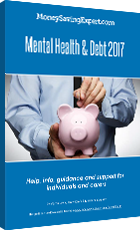Mental Health & Debt 2016
Martin launches the Money and Mental Health Policy Institute
Having planned it for years, Martin's founded the big new Money and Mental Health Policy Institute to be run by former No. 10 special advisor Polly Mackenzie. The aim is to research, investigate and lobby for change on mental health issues and debt.
As an idea of what it'll look at, one area of exploration is giving people tools when they're well, so they can control themselves when they're not.
For example, spending sprees are common both with clinical depression and bipolar disorder. So being able to put a freeze on your credit file that takes eight weeks to unlock, so you can't apply meanwhile, would be useful.
For more info, see the video and news story Stop the debt and mental health marriage made in hell. To help the new institute, if you're affected please take this 5min survey.
Also launched the Mental Health & Debt Guide 2016.
Why we wrote this booklet
A message from MartinBe under no illusions. Mental health problems can cause severe debt, and severe debt can cause mental health problems.
Debt isn't just a financial problem, it causes relationships to break up, people to lose their homes and families to break down. No matter who you are, it can be hell.
For many living with mental health issues, debt is a common problem. My usual line is we should focus on being responsible borrowers, as you can't expect lenders to be responsible – their job is flogging debt.
A few years ago, I had my eyes opened. A man came up to thank me for the MoneySavingExpert.com website. I asked him if he'd saved much money, and his answer surprised me:
"I don't use it for myself. I'm a mental health case worker, and almost every one of my clients has debt issues. It's tough for them to control many areas of their life. I use your site to help them sort through their problems."
This is the crux. How do we help those who are unable to be responsible for themselves? It is not always easy to be responsible for yourself – and the easy credit years created a potential disaster scenario.
Since then I've heard that story echoed time and time again. I pitched the idea to TV outlets several times, only to be told it doesn't resonate with enough people.
That's wrong. Many people have either had issues or have a family member who has. One in four British adults experience at least one mental health problem in any one year, according to a 2009 Health & Social Care Information Centre report. This is an issue we have to tackle.
Yet it's not right to simply stop anyone with mental health issues getting credit. Often issues are temporary, and, even if not, debt isn't bad, bad debt is bad. A rational decision to borrow cheaply is fine. Mortgages, student loans and more are an integral part of the modern financial world.
While describing the problem is easy, the solutions aren't. I wish I could promise this guide will solve them. It won't, though it should help make things easier to understand and deal with.
Martin LewisMSE founder & editor
Martin says "No debt problems are unsolvable. It might not be easy or quick, but there's always a route. When mental health problems are involved, some special solutions apply."
Get the free Mental Health & Debt guide

This is a free 44-page PDF booklet supported by Mind, Rethink, CAPUK and others, for people with mental health problems and those caring for them.
It covers how to handle debts when unwell, work with banks, free debt counselling, specific tips for bipolar disorder or depression sufferers, whether to declare a condition and more.
Download the guide here - Mental Health & Debt 2016
Your login details have been used by another user or machine. Login details can only be used once at any one time so you have therefore automatically been logged out. Please contact your sites administrator if you believe this other user or machine has unauthorised access.





